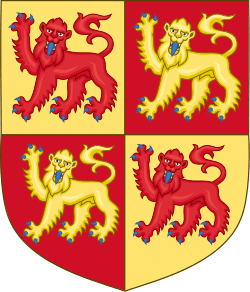Gruffydd Robert
Gruffydd Robert (before 1532 – after 1598) was a Welsh priest in the Catholic Church and grammarian who wrote a pioneering Welsh grammar, in Welsh, while in enforced exile with his colleague and fellow-writer Morys Clynnog in Milan in 1567.
Life
He was from North Wales, either from the Vale of Clwyd or Anglesey. He was awarded an MA degree from Christ Church, Oxford in 1555 before taking office as archdeacon of Anglesey in 1558. Shortly after his appointment Mary I of England died and Protestantism was re-introduced in England and Wales with the Supreme Law (1559). Catholicism remained strong in Wales and Gruffydd was among those who remained faithful to the old religion.
Gruffydd and Morys Clynnog went to the continent in exile after the accession of Elizabeth I of England. He travelled to other parts of the continent at that time, such as France and Germany. By January 1564 he was in Rome with Clynnog both having become chaplains in the English Hospital in Rome.
By 1567 when the first part of his grammar was published Gruffydd was employed by Cardinal Borromeo[1] Archbishop of Milan. Gruffydd was referred to as a doctor by Anthony Munday and Morris Kyffin. He may have received a doctorate at Louvain, Belgium or during his time with Borromeo in Milan. He was confessor to Borromeo and a theological canon at Milan Cathedral. During the 1567 plague he worked as an assistant distributing alms with Borromeo. He stayed in Milan for almost twenty years in the service of Borromeo.
In 1582 Gruffydd requested retirement as theological canon probably because his Italian was not sufficiently fluent for preaching. There was no other position vacant so he received a pension in 1594. After Borromeo's death in November 1584 Gruffydd had more time to work on his grammar.[2]
His Grammar
The first part of his grammar was published as Dosbarth Byrr ar y rhann gyntaf i ramadeg Gymraeg (A short lesson on the first part of Welsh Grammar) in Milan on Saint David's Day in 1567. The second part is likely to have appeared in 1584 or 1585. The first two parts use the form of a dialog in a vineyard between two friends, namely Gruffydd and Clynnog. The third part does not use this form, perhaps because Clynnog had drowned around 1581 and Borromeo, who is referred to as master or lord in the grammar had also died in 1584. The other parts are shorter: the fourth part discusses the measures of music; the fifth part gives a collection of poems; and the contents of the sixth part begin the translation of Cato Maior de Senectuteby Cicero.[3]
Bibliography
- T. Gwynfor Griffith, 'Italian Humanism and Welsh Prose' in Yorkshire Celtic Studies (vol. vi, 1953–58). The background.
- D. Rhys Phillips, Dr. Griffith Robert, Canon of Milan (1922).
- G. J. Williams (ed.), Gramadeg Gruffydd Robert (University of Wales Press, Cardiff, 1939). The standard edition of Gruffydd Robert's grammar, with an extensive introduction.
Notes
- Griffith, T. Gwynfor. "Robert, Gruffydd". Oxford Dictionary of National Biography (online ed.). Oxford University Press. doi:10.1093/ref:odnb/23752. (Subscription or UK public library membership required.)
- Williams, GJ. Gramadeg Cymraeg Gruffydd Robert.
- Williams, GJ. Gramadeg Cymraeg Gruffydd Robert.
